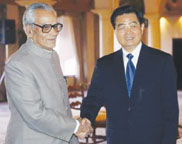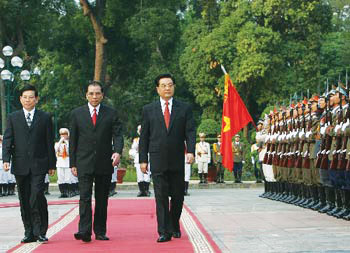China Flexes Muscles
Middle Kingdom hosts summit meetings with 48 African countries, ASEAN
 China has lately been flexing its economic muscle around the world, focusing on securing natural resources, oil and minerals in particular. Ancient Chinese people believed that China is in the center of the world as China in Chinese characters mean and still many modern-day Chinese appear to be no different from their ancestors, although communists have been ruling the Middle Kingdom.
China has lately been flexing its economic muscle around the world, focusing on securing natural resources, oil and minerals in particular. Ancient Chinese people believed that China is in the center of the world as China in Chinese characters mean and still many modern-day Chinese appear to be no different from their ancestors, although communists have been ruling the Middle Kingdom.
China appears to be out to build China "consensus"against Washington "consensus,"a U.S. led political, and economic discipline, according to China watchers in Hong Kong. They pointed at China's recent waves of diplomatic offensives aimed at Africa and Southeast Asia.
In early November alone, two large diplomatic events took place in China, one in Nanning where 10 leaders of ASEAN countries including Singaporean Prime Minister Lee Hsien-loong and Philippines President Gloria Arroyo gathered in the China-ASEAN summit. Each leader had one-on-one meeting with Chinese premier Wen Jiabao during the meeting and issued joint statement pledging mutual cooperation with China in various areas.
They noted that the event was the first case of the ASEAN leaders, all 10 in all, visited China under the 10+1 formula. The two way trade between China and ASEAN, which amounted to $7.6 billion in 1991, has ballooned to $13 billion last year,
 increasing more than 15 times, indicating the importance of China for the ASEAN countries, which can be compared to a saying that if China coughs, ASEAN catch cold to show their mutual dependence on each other. The birth of "Chinese sphere common economic body through FTA to be concluded in 2010 is not far off.
increasing more than 15 times, indicating the importance of China for the ASEAN countries, which can be compared to a saying that if China coughs, ASEAN catch cold to show their mutual dependence on each other. The birth of "Chinese sphere common economic body through FTA to be concluded in 2010 is not far off.
China signed a non-nuclear agreement with ASEAN, in addition to an agreement to facilitate military support including the training, military exchange and technology, gaining a strategic advantage to break up the U.S. fence around China.
The Beijing Summit & Third Ministerial Conference of Forum on China and Africa held Nov.3 &4 in Beijing in which heads of 48 African states participated showed China's strong diplomatic reach. Those leaders held 75 different meetings with Chinese leaders including President Hu Jintao. The event was the first one in the world's diplomatic history, where that many heads of state visited a country and held summit meeting.
 China forgave $10 billion in debts owed by African countries and promised to upgrade its economic cooperation with those countries, including the training and personnel exchange, among many gifts that China gave them. China also promised to double its financial assistance to Africa to $5 billion in loans and credit. The country is said to have spent some $50 million on its meeting with ASEAN leaders in Nanning to captivate the minds of those leaders.
China forgave $10 billion in debts owed by African countries and promised to upgrade its economic cooperation with those countries, including the training and personnel exchange, among many gifts that China gave them. China also promised to double its financial assistance to Africa to $5 billion in loans and credit. The country is said to have spent some $50 million on its meeting with ASEAN leaders in Nanning to captivate the minds of those leaders.
Those diplomatic events have two meanings: One is the change in China's diplomatic paradigm that "China will act when its needed"from "China will hide beams and grows its strength."The other one is the emergence of China on the world stage and the possibility for the third world countries to become China's satellite states. The picture of ASEAN leaders visiting Chinese Premier Wen Jiabao one by one at a hotel where the premier was staying reminded of old days when foreign emissaries paid their respects to emperors of the Middle Kingdom like the revival of the Imperial China.
China's design for those events were very clear to its neighboring countries, namely South Korea, Japan and Taiwan.
Both Korea and Japan have been just watching the events unfold in China. Korea, for one, has been stepping its resources diplomacy of its own. President Roh Moo-hyun visited a number of countries in North Africa and the Middle East this year, which was followed by Prime Minister Han Myung-sook who made a swing through the Central Asia and the Middle East this late this year.
President O. Obasanjo of Nigeria visited Seoul early this year and struck a deal to modernize its railroad stretching for some 1,500 km at the cost of $10 billion. Under the deal, Nigeria will pay for the project partly with stakes in an oil field.
To compete with China, South Korea should tighten its ties with its allies. Getting alienated from the U.S. its only ally further and further as it has been doing lately and making concession after another to the worst dictatorial regime in the world in North Korea are not the answer. It should develop its economy and technology to build its national brand image that China can't imitate, which is the only way for Korea to keep its self-respect and independence. nw
(from Left) President Roh Moo-hyun, left, shakes hands with his Chinese counterpart Hu Jintao in Beijing Oct. 13 following North Korea's nuclear test. Chinese President Hu Jintao shakes hands with Indian Vice President Bhairon Singh in New Delhi Nov.20. Chinese President Hu Jintao, 3rd L, inspects the honor guard as he arrives at the Presidential Palace in Hanoi Nov. 16 accompanied by his Vietnamese counterpart Nguyen Minh Triet, 1st L.
3Fl, 292-47, Shindang 6-dong, Chung-gu, Seoul, Korea 100-456
Tel : 82-2-2235-6114 / Fax : 82-2-2235-0799